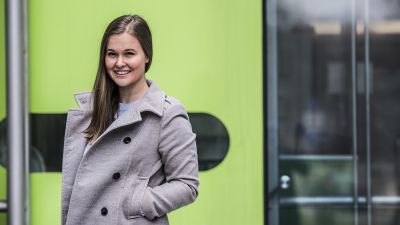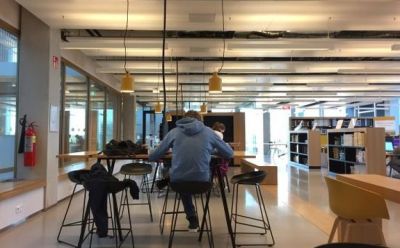Karolína Bartošová is a student in media and communications studies at the Department of Electronic Culture and Semiotics at the Faculty of Humanities. Last year, she flew to Macquarie University in Sydney under inter-university agreements for a six-month internship - and ended up staying even longer. She shared her experience of Australia – and studying at Macquarie – with Forum magazine.
“I applied for a postgraduate degree in International Communications at the Faculty of Arts, Macquarie University. I started to work things out a year in advance, saying that the original plan was only to set off for six months, but I liked it so much that I extended my stay by another half-a-year,” she says.
Australia was nothing if not intriguing.
“In Australia, there are countless ways to have fun and endless things to explore. People don’t stress about anything, and most importantly, they don’t chase after anything. As soon as their work is done, they set problems aside and enjoy life. On the other hand, even their ‘No worries, mate’ atmosphere can tick you off sometimes. There’s always plenty of time for everything, and they're not always the most responsible... So it gets on your nerves sometimes. But if you catch the same wave as them, eventually you'll find it's not that big a deal, and you enjoy their carefree approach.”
Karolína had to go into a three-month quarantine as soon as she arrived but took it in stride. “It turned out to be a benefit as prices went down, so I moved to the beach and took up surfing, and then traveling a little bit. My dream in Australia was always to see the Great Barrier Reef, only to have to cancel twice because of the opening and closing of the internal borders. I cancelled five trips altogether, but on the other hand, I was able to visit other great places. I flew to Tasmania, took part in two surfing camps, travelled to the Daintree - the oldest rainforest in the world, even older than the Amazon forest – and then visited the [aforementioned] barrier reef.”
She had some remarkable experiences she won’t likely soon forget: “An emu crossed my path in the forest, I got stung by a jellyfish [in the water], a large lizard jumped into my bed, I was swept away by the ocean current, I slept in my jacket in the winter (you’ll be surprised if you expect central heating here), I got lost alone in the woods, and saw two sharks while diving. “I guess [my motto could be] What doesn't kill you, makes you stronger!”
A common preconception about life in Australia is that it is adventurous because of all the dangerous local wildlife. “People imagine that as soon as they get off the plane they will be overcome by snakes and jumping spiders and that if you dip your ankle into the sea, you’ll lose your foot in a flash!” she laughs. Certainly, care should be taken and [wildlife should be] respected, she says, but in most cases wild animals avoid humans if they can. A case in point, where she was no doubt lucky, came in Tasmania, where she saw a small half-metre long snake slithering its way across a path in the words; a day later, on an information board at a local museum, she learned the species was very poisonous indeed. “You have to be careful and keep your guard up in the jungle,” she agrees.
University Life
Did she enjoy studying in Australia? Absolutely.
“Macquarie University is great in so many ways. The campus offers a variety of student hubs and facilities for self-study as well as group work. You can find computers and self-service printers, cafeterias with great coffee, a park, a gym, on every corner and the library looks more like an oasis of calm. Study itself focuses a lot on hands-on experience. Teachers are practitioners who were more our mentors when working on projects. One of the most interesting was our successful media campaign for the Power House of Sydney’s Science Museum. My favourite subject was Storytelling Techniques, where we learned, among other things, how storytelling can be used in marketing and, more generally, how to work with the power of story,” Karolína says, offering comparisons to her alma mater.
“Studying at CU is more complex and challenging given both the scale and number of compulsory examinations, with students having to be able to place their subject in a wider context. For example, when it came to the history exam for my Bachelor’s at Charles University, it simply wasn't enough to know the basics, you had to approach the subject deeply, to see continuities, and be able to explain them. No wider context was required at MQ. And so even though in the world ranking of universities CU is about 200 places behind the MQ, as a student who experienced both, I can say that Charles University is more prestigious, sophisticated and rigorous. At Charles University, you really have to work for your marks and it is a grind to get your degree.
“At MQ, you only have to fill attendance and successfully manage the projects during the year; no exam was needed. Which is a bit of a shame, because I believe it would have given me even more. To summarize, I think of my internship at Macquarie University as an excellent cap on my Master's degree, which gave me the opportunity to take a hands on approach.”
A few tips from the field
If you want to study abroad and get support, it’s important to get all details in order. Karolína told us she applied a year in advance, provided necessary documentation including her results at university, a motivational letter, and more. Once approved, she was eligible for 90,000 crowns support per semester (the equivalent of around 4,177 US dollars or 5,575 Australian dollars). She was very grateful to receive the financial support but students should know the funds don’t cover all the costs.
“I am very grateful for this contribution, however, the scholarship alone is not enough as it will cover only half the costs. I had some money saved up, and during the quarantine I was able to work with several start-ups, whom I helped with marketing. I did that in the Czech Republic. Later I found a part-time job at a coffee shop, therefore I managed to make some money for travel,” she explains.
Although Karolína was only due to be away for half-a-year, it’s now been more than a year and she’s in Australia still. She says the events of last year taught her not to plan “too far ahead” and for the moment she’s not sure when she will return home. “A lot of Australians ask me why I left Prague, exclaiming Prague is great and that there are more opportunities in Europe. And better schools!
“I was surprised [by their reaction] because for us Australia is very much a ‘promised land’. But it really depends what you want to get out of it. Sydney is more like a big village without all that much going on. Cafes and shops close no later than 5 p.m., and don't look for too much culture and history either. People spend their time here mostly at home and in nature. Success and ambition for locals ranks somewhere beyond surfing, friends and barbecues.
“Things really are very different here. But when I was studying for my final exams with salt in my hair and sun on my back, in between I could [swim in the ocean], I see that as the greatest reward for years of hard work. I'm happy to be here, and while it may seem like I'm exaggerating a little, all of it is true. Australia is not for the faint of heart. There is a lot to get out of it – lots of great experiences and incredible adventures – but you have to have the stomach for them,” says Karolína, often posting her experiences for followers on her Instagram account.

























